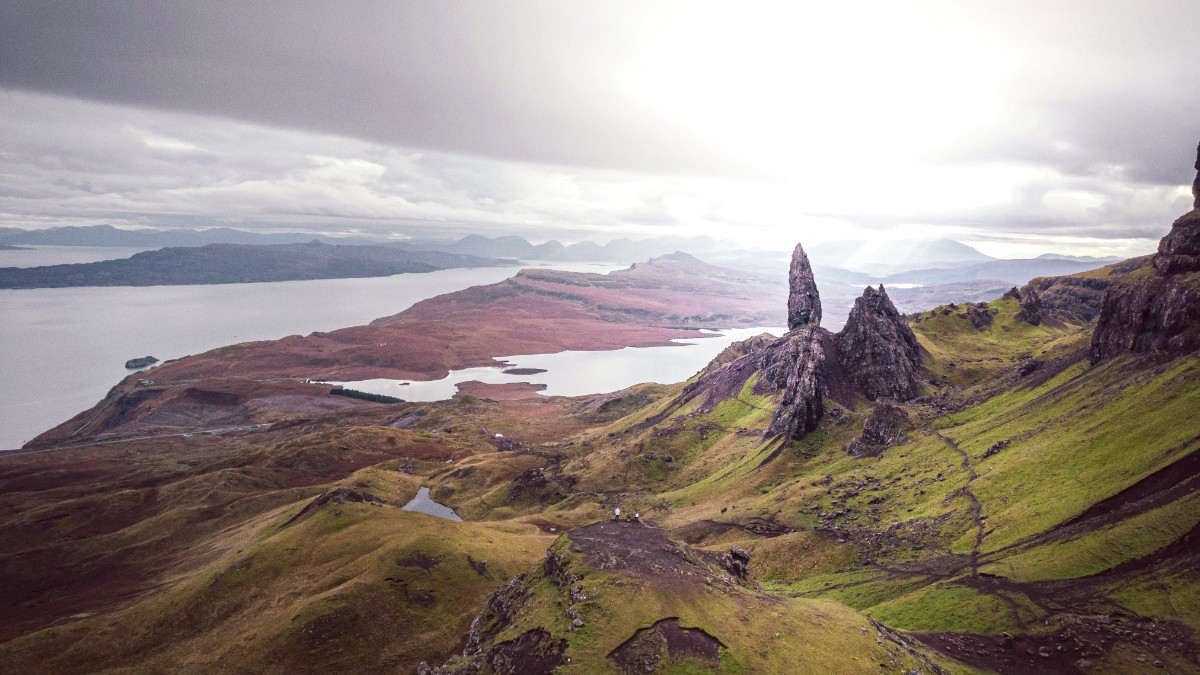
Highlands And Northern Islands, Scotland
Summer (June - August): This period holds the warmest temperatures, with averages ranging from 11°C to 17°C (52°F to 63°F). Daylight hours remain long, reaching up to 18 hours in June, making ample time for exploration. Precipitation is common, but often arrives in short bursts, permitting periods of sunshine. Humidity is moderate to high, notably contributing to the activity of midges, small biting insects.
Winter (November - March): The coldest months, with average temperatures from 2°C to 8°C (36°F to 46°F). Daylight hours remain short, as little as 6-7 hours in December. Snow and ice are possible, notably on higher ground. Many tourist services operate on reduced hours or close completely.
Weather on Skye changes quickly. A bright, sunny morning turns into heavy rain or dense fog within minutes. Dress in layers to adapt.
Midges: These small, biting insects pose a concern from late May to September, notably during still, damp conditions and at dawn or dusk. They are most prevalent near water or in sheltered, vegetated areas.
Crowds & High Prices
Longest daylight hours, warmest temperatures, all services operational, highest chance of clear weather.
Most crowded period, peak prices for accommodation and activities, midge season peaks.
Fewer Crowds & Moderate Prices
Fewer crowds, generally lower prices, pleasant temperatures, manageable midge activity.
Weather less predictable, higher chance of rain/wind, some smaller services may have reduced hours.
Few Crowds & Lowest Prices
Very few crowds, lowest prices, dramatic landscapes with possible snow.
Very short daylight, cold temperatures, higher chance of snow/ice, many closures, challenging driving conditions.
May, June, September, and October hold a good balance of decent weather, sufficient daylight, and fewer midges or crowds than peak summer months for hiking. April and May are good for wildflowers. Winter has dramatic, stark landscapes, but calls for flexibility due to more challenging weather.
May to September has the best visibility and conditions for boat tours. Shoulder seasons permit easier navigation of roads with less traffic congestion, specifically on single-track routes.
May, June, September, October
April, May (wildflowers); Winter (dramatic landscapes)
May to September
Shoulder seasons (April-May, September-October)
Entry to the Isle of Skye follows the immigration rules of the United Kingdom.
The UK Home Office sets all visa and entry requirements for Scotland and the Isle of Skye.
Upon arrival, present your passport and supporting documents to a Border Force officer. Eligible nationalities can use automated ePassport gates.
The UK has reciprocal healthcare agreements with some countries (e.g., EU countries via the EHIC/GHIC card). Check your eligibility before you travel. For all other nationalities, private travel insurance is needed.
Costs vary widely based on your travel style and preferences.
The official currency is the Pound Sterling (£, GBP). ATMs remain widely available in larger towns on Skye, like Portree and Broadford.
Credit and debit cards (Visa and Mastercard are most widely accepted) are common for payments, with contactless payment options available in many places. Some smaller shops or remote establishments may prefer cash or have minimum card spend limits.
Daily average: £50 - £80 per person (excluding major tours or flights to UK)
Accommodation: Hostel dorm bed or basic campsite pitch (£25-£40).
Food: Supermarket groceries, cheap takeaways, or basic pub meals (£15-£25).
Daily average: £100 - £180 per person (excluding major tours or flights to UK)
Accommodation: B&B, guesthouse, or mid-range hotel room (£60-£100).
Food: Mixture of self-catering, pub meals, and casual restaurants (£30-£50).
Daily average: £250+ per person (excluding major tours or flights to UK)
Accommodation: Luxury hotel, high-end self-catering cottage (£150+).
Food: Fine dining experiences, extensive restaurant meals with drinks (£70+).
| Category | Item | Price Range |
|---|---|---|
| Accommodation (per night) | Hostel Dorm Bed / Guesthouse / Luxury Hotel | £25-£45 / £80-£180 / £250+ |
| Meals (per person) | Breakfast / Lunch / Dinner (mid-range) | £10-£18 / £12-£25 / £25-£50 |
| Transportation | Local Bus Fare / Car Rental (economy, per day) / Fuel (per liter) | £2-£5 / £40-£80 / £1.45-£1.60 |
Your well-being on the Isle of Skye holds importance. Get ready for common health concerns, understand access to services, and know safety measures for your visit.
Use Strong insect repellent (DEET/Picaridin) and wear long clothing. Check for ticks after walks and use a Tick remover tool.
Dress in layers. Carry waterproof/windproof outerwear. Use Broad-spectrum sunscreen (SPF 30+), hat, and Sunglasses.
Wear sturdy, Waterproof hiking boots. Use trekking poles for stability. Stay on marked paths.
Emergency Number: Dial 999 or 112 for Police, Ambulance, or Fire. Calls are free.
Portree Hospital provides minor injuries services. For major emergencies, Raigmore Hospital in Inverness is the nearest major hospital.
GP surgeries and pharmacies are in larger towns (Portree, Broadford, Dunvegan). Dental care is limited.
Tap water on Skye is safe to drink. Food safety standards in the UK are high.
Skye has a very low crime rate and is a safe destination. Theft from unattended vehicles may occur at popular tourist spots.
Always lock your car. Do not leave valuables visible. Be aware of surroundings. Inform someone of hiking plans in remote areas.
High winds/storms, heavy rainfall, and winter conditions (snow/ice) may occur. Coastal hazards like tides and strong currents are present. Check forecasts.
Save these numbers and carry physical copies. Your embassy/consulate in London or Edinburgh can assist with lost passports and citizen services.
Print a copy and save a digital copy of your travel insurance policy details. This includes emergency contact numbers, your policy number, and a summary of your coverage.
Covers emergency treatment, evacuation to a major hospital, and repatriation.
For unforeseen circumstances like illness, family emergencies, or natural disasters.
Covers the cost of replacing lost or stolen luggage and personal items.